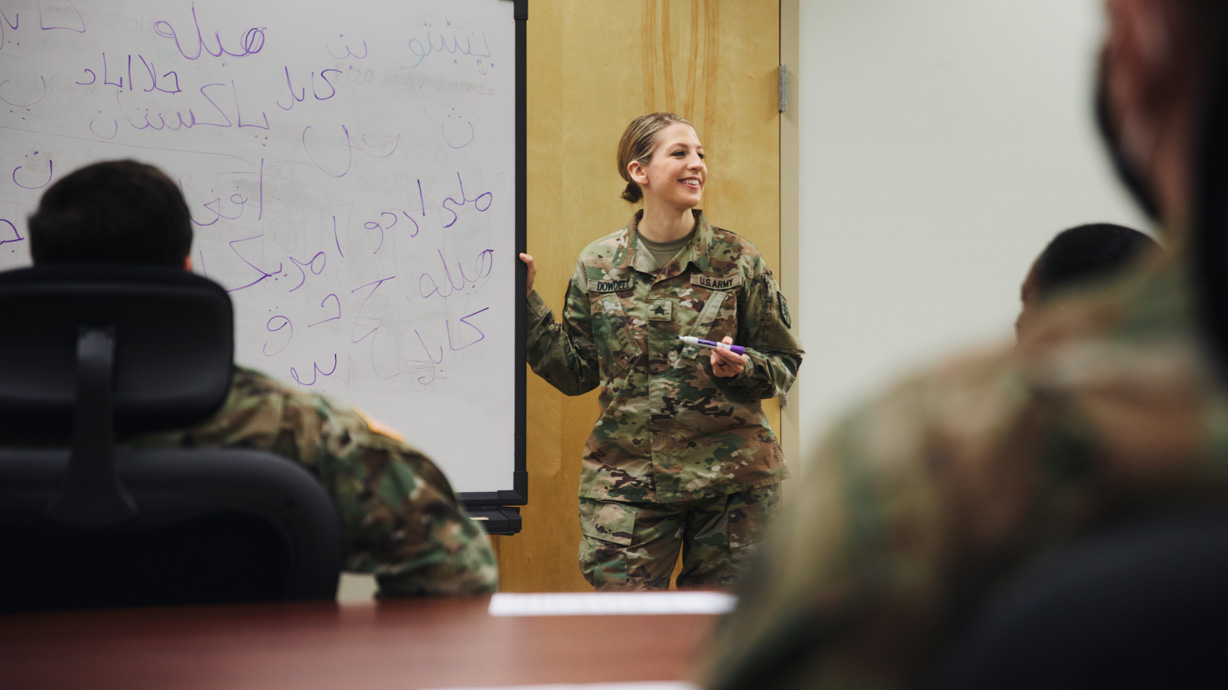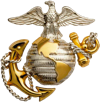Explore Careers
Interpreters and Translators

What do Interpreters and Translators do in the Military?
Where do Interpreters and Translators work?
Interpreters and translators normally work on military bases, aboard ships, or in airplanes.
How much do they make?
Median Military Salary
This is the median, or the midpoint, of the salary range for this career.
Note that the median salary does not include bonuses, special pays, health or dental benefits — which are a standard part of military compensation.
This is the median, or the midpoint, of the salary range for this career.
Note that the median salary does not include bonuses, special pays, health or dental benefits — which are a standard part of military compensation.
$87,567
Military Salary Range
This is the range based on years of service, degree level, special pays, family status and location.
Note that the median salary does not include bonuses, special pays, health or dental benefits — which are a standard part of military compensation.
This is the range based on years of service, degree level, special pays, family status and location.
Note that the median salary does not include bonuses, special pays, health or dental benefits — which are a standard part of military compensation.
$20,988 - $320,663
How Military Pay is More Than Just a Salary
Base pay is the standard income you'll earn as a service member, providing a stable foundation to start achieving your financial goals.
- Set based on rank and years of service.
- Paid every month.
Allowances are additional payments to help cover living expenses like housing and food.
- Tax-free payments.
- Varies by location and family status.
Special pay provides extra compensation for unique skills, hazardous duties, or challenging assignments.
- Based on specialized roles.
- Varies by position and duty.
The Interpreter: Myah Riggans
An anthropologist is always searching for something. And as a Navy linguist, or Cryptologic Technician - Interpretive, Myah Riggans is one of them. But she didn’t dig in her own backyard to find purpose—she found hers thousands of miles away on a tiny island in the Arabian Gulf.
Transcription
Growing up, I was really lucky to be exposed to all different kinds of people, and religions, and different cultures. It really set me up to go places and see things that people said that I shouldn’t. Language acquisition was always easy for me, and that was fueled predominantly just by my interest in the culture, and my desire to learn and, and do well. As you learn the language, you learn the people, you learn their history. It teaches you how we are, and why interactions socially are so important socially to the success of a civilization.
There was a lot of students at my high school that were looking into going into the Navy, and it just so happened that I was introduced to the recruiter, who really made an effort to sit down with me and say what do you want to do, what are you interested in, and the minute that I started talking about languages, he’s like, let’s get you in for a D lab.
When I got my D lab results, it was definitely kind of a self validation, like hey, not only is this something that I really enjoy, but it’s something I’m good at, this is a career. At 18, right after high school graduation, I packed up all my stuff and I headed off to an amazing adventure as a CTI.
When the ship is in port in Bahrain, the member is released. A CTI is a cryptologic technician interpretive, and we are the Navy’s linguists. We do everything that is language and culture for the Navy.
Once you hop on the highway, you’re going to cross over the Hidd Bridge. Once you pass the Hidd Bridge, you’re going to pass by Hidd.
We provide direct support and safety measures for ships, aircraft. We also do one on one coordination with three letter agencies.
Take the Manama Way through Muharraq into the international airport. It’s a little tricky, however, taking...
A lot of times, the normal day of aCTI is sitting behind a computer. It may not appear glamorous, but what a lot of people don’t see is where all that hard work goes. We provide the intelligence for all major military operations. We really steer all aspects of warfare and strategic decisions.
A huge part of being a linguist or a CTI is knowing the culture, knowing the people, being able to kind of know and read the person speaking is just as important as knowing the language itself.
There’s only 300 fills for that.
It has been very hard for me to acclimate to living in a Middle Eastern country. But if you only know your way of life, you limit yourself in being successful with your interactions with people. You have to be able to find that common ground, to find that respect and understanding for a difference, in order to be able to work together. It is such a huge foundation in our nation, and that’s important for trade, for success.
Stupid, (laughs) and ridiculous.
Yup, this is our family.
Being deployed here in Bahrain is an amazing experience. It’s helped me sharpen all of the tools that I had growing up. I went from being a teenager that grew up in Cheyenne, Wyoming, to being an adult living in Bahrain. I’ve gotten married, I’ve gotten my first home in the Navy, I’ve really found myself, and the kind of person, the kind of leader that I want to be, in the Navy.
The Interpreter: Myah Riggans
What training do Interpreters and Translators gain in the Military?
All enlisted service members complete basic military training, which includes time spent in a classroom and in the field, and covers tactical and survival skills, physical training, military life and customs, and weapons training. Interpreters and translators in the Military will gain skills through classroom study and on-the-job experience. Training length varies depending on specialty; longer training is necessary for specialties that do not require foreign language fluency prior to entry. Job-specific training content may include:
- Interrogation methods
- Use and care of communications equipment
- Procedures for preparing reports
- Cultural awareness
Military Training for Enlisted Service members
All enlisted service members complete basic military training, which includes time spent in a classroom and in the field, and covers tactical and survival skills, physical training, military life and customs, and weapons training.
What skills help Interpreters and Translators succeed?
- Interest in reading and writing
- Interest in working with people
- Talent for foreign languages
What are possible career paths after the Military?
- Interpreters and Translators
- Sociologists
- Speech-Language Pathology Assistants
- Foreign Language and Literature Teachers, Postsecondary














